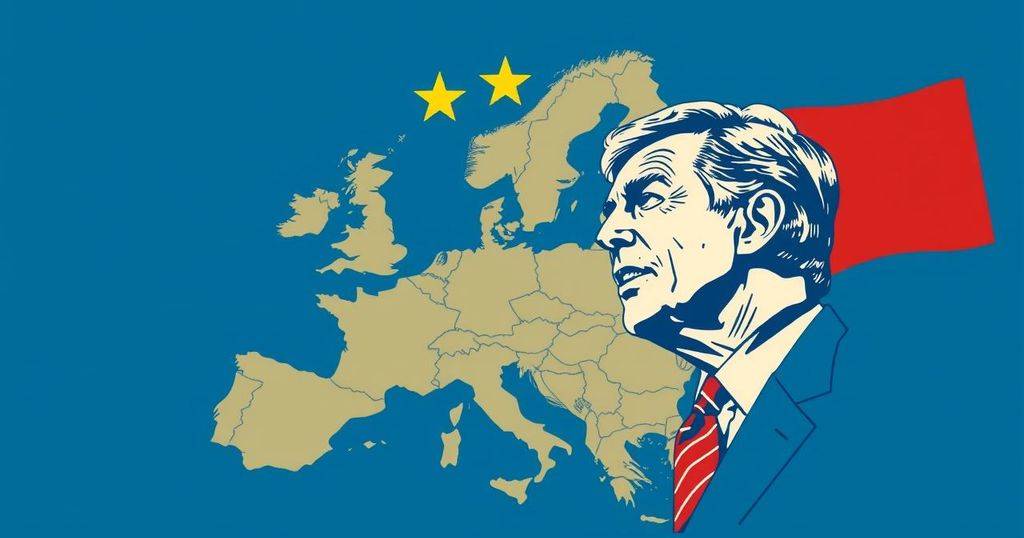Viktor Orbán’s provocative meeting with Donald Trump following NATO’s anniversary has incited outrage among EU leaders as Hungary adopts the presidency of the European Council under the slogan “Make Europe Great Again.” The agenda emphasized economic competitiveness while sidelining environmental initiatives and dismissing EU fundamental rights. Orbán’s diplomatic overtures have been met with calls for boycotts of Hungarian-led meetings, reflecting deep divisions within the Union amid Hungary’s controversial stance on various issues, including its approach to Ukraine and migration.
Viktor Orbán, the Prime Minister of Hungary, has garnered significant attention due to his provocative stance. Following a recent NATO anniversary, Orbán met with former U.S. President Donald Trump, where they purportedly discussed a “peace mission” aimed at addressing the ongoing conflict in Ukraine. This meeting has sparked outrage among European leaders, with Charles Michel, President of the European Council, expressing concern that Hungary, which assumed the rotating presidency of the EU on July 1, is misrepresenting the bloc on the international stage. Notably, Hungary’s presidency is being characterized by the slogan “Make Europe Great Again,” evoking a similar rhetoric used by Trump. The role of the EU presidency rotates among member states approximately every thirteen and a half years, entailing responsibilities such as planning and conducting meetings of the Council, as well as representing the Council in negotiations. However, it is crucial to note that Hungary’s presidency lacks the authority to externally represent the EU, a role designated to the President of the European Council, the President of the European Commission, and the High Representative for Foreign Affairs. In setting its agenda, Hungary has spotlighted seven key issues, including enhancing the EU’s economic competitiveness through a proposed “New European Competitiveness Deal”. This initiative seeks to bolster the position of small and medium-sized enterprises although it appears to sidestep initiatives aimed primarily at environmental sustainability. Crucially, Hungary’s plans do not reflect a commitment to the EU’s fundamental rights or values, having faced criticism for curtailing democratic freedoms domestically. Orbán’s presidency commenced with controversies, illustrated by his meetings with both President Volodymyr Zelenskyy of Ukraine and President Vladimir Putin of Russia, alongside his unchallenged endorsement of Chinese President Xi Jinping’s peace efforts, actions that diverge from the EU’s collective position. This has led to strong reactions from Brussels, with statements emphasizing that Orbán does not represent EU perspectives abroad. Additionally, in light of Orbán’s unilateral diplomatic actions, the European Commission has advised its commissioners to abstain from participating in informal ministerial meetings within Hungary, resulting in notably low attendance at key events under the Hungarian presidency. This situation has driven the European Parliament to pass a resolution questioning Hungary’s ability to fulfill its presidential duties credibly and advocating for suitable measures to be taken against it, although such resolutions are not binding for the Council. In summary, Orbán’s approach as one who champions a more authoritarian style of governance raises alarms regarding both Hungary’s and the European Union’s future as it navigates complex geopolitical relationships while attempting to uphold foundational principles. As seen, Orbán is committed to his ideology, continuing with his motto, “Make Europe Great Again,” which reflects a wider tension within the Union regarding the balance between national and collective European identities in the face of diverse political ideologies and foreign policy objectives.
The article discusses the implications of Hungary taking up the rotating presidency of the European Union. Viktor Orbán’s administration has often been marked by controversial decisions and rhetorical flourishes, particularly regarding his foreign policy that seems to align with nationalist sentiments. The political context is important for understanding how Hungary’s presidency may affect EU unity, especially in relation to critical issues like the Ukraine conflict and the EU’s broader responses to internal and external challenges. Orbán’s meetings with international leaders serve to highlight Hungary’s independent stance, which raises concerns within the EU regarding representation and adherence to shared values.
Overall, Viktor Orbán’s presidency of the EU raises significant questions about Hungary’s role and intentions within the bloc. His interactions with leaders who oppose EU norms, coupled with domestic policies that undermine democratic principles, suggest a troubling trajectory for both Hungary and the European Union. The phrase “Make Europe Great Again” serves as a provocative reminder of the ideological divides that challenge European cohesion and shared governance moving forward.
Original Source: www.treffpunkteuropa.de

Leave a Reply